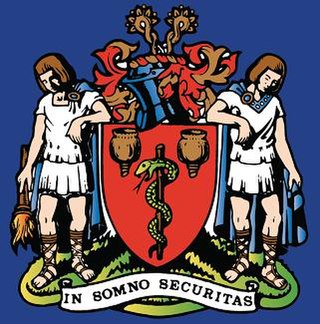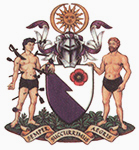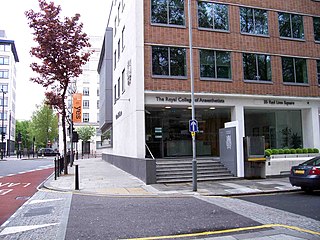
Gastroenterology is the branch of medicine focused on the digestive system and its disorders. The digestive system consists of the gastrointestinal tract, sometimes referred to as the GI tract, which includes the esophagus, stomach, small intestine and large intestine as well as the accessory organs of digestion which include the pancreas, gallbladder, and liver.

The Association of Anaesthetists, in full the Association of Anaesthetists of Great Britain and Ireland (AAGBI), is a professional association for anaesthetists in the United Kingdom and Ireland.
Action on Smoking and Health (ASH) is the name of a number of autonomous pressure groups (charities) in the anglosphere that seek to publicize the risks associated with tobacco smoking and campaign for greater restrictions on use and on cigarette and tobacco sales.

The Royal College of Emergency Medicine (RCEM) is an independent professional association of emergency physicians in the United Kingdom which sets standards of training and administers examinations for emergency medicine. The patron is the Princess Royal.
Professor Sir Bruce Edward Keogh, KBE, FMedSci, FRCS, FRCP is a Rhodesian-born British surgeon who specialises in cardiac surgery. He was medical director of the National Health Service in England from 2007 and national medical director of the NHS Commissioning Board from 2013 until his retirement early in 2018. He is chair of Birmingham Women's and Children's NHS Foundation Trust and chairman of The Scar Free Foundation.

The Royal College of Anaesthetists (RCoA) is the professional body responsible for the specialty of anaesthesia throughout the United Kingdom. It sets standards in anaesthesia, critical care, pain management, and for the training of anaesthetists, physicians' assistants (anaesthesia), and practising critical care physicians. It also holds examinations for anaesthetists in training, and informs and educates the public about anaesthesia. Its headquarters are in Churchill House, London.
Recommendations for consumption of the drug alcohol vary from recommendations to be alcohol-free to daily or weekly drinking "safe limits" or maximum intakes. Many governmental agencies and organizations have issued guidelines. These recommendations concerning maximum intake are distinct from any legal restrictions, for example countries with drunk driving laws or countries that have prohibited alcohol. To varying degrees, these recommendations are also distinct from the scientific evidence, such as the short-term and long-term effects of alcohol consumption.

The Royal Australasian College of Physicians (RACP) is a not-for-profit professional organisation responsible for training and educating physicians and paediatricians across Australia and New Zealand.
Tobacco harm reduction (THR) is a public health strategy to lower the health risks to individuals and wider society associated with using tobacco products. It is an example of the concept of harm reduction, a strategy for dealing with the use of drugs. Tobacco smoking is widely acknowledged as a leading cause of illness and death, and reducing smoking is vital to public health.
Sir Ian Thomas Gilmore DL PRCP is a professor of hepatology and previous president of the Royal College of Physicians of London (PRCP).

Sir Liam Joseph Donaldson is a British physician. He was formerly the Chief Medical Officer for England, being the 15th occupant of the post since it was established in 1855. As such, he was principal advisor to the United Kingdom Government on health matters and one of the most senior officials in the National Health Service (NHS).

The Academy of Medical Royal Colleges (AoMRC) is the coordinating body for the United Kingdom and Ireland's 24 Medical Royal Colleges and Faculties. It ensures that patients are safely and properly cared for by setting standards for the way doctors are educated, trained and monitored throughout their careers. The Academy Council meet regularly to agree direction. The Council comprises the Presidents of the member Colleges and Faculties and four coopted council members.

Andrew K. Burroughs was a British physician, researcher and teacher. He is renowned for his wide contribution to the field of Hepatology; he has been termed one of the greatest hepatologists of our times and the true representative of Dame Sheila Sherlock's legacy.
The scientific community in the United States and Europe are primarily concerned with the possible effect of electronic cigarette use on public health. There is concern among public health experts that e-cigarettes could renormalize smoking, weaken measures to control tobacco, and serve as a gateway for smoking among youth. The public health community is divided over whether to support e-cigarettes, because their safety and efficacy for quitting smoking is unclear. Many in the public health community acknowledge the potential for their quitting smoking and decreasing harm benefits, but there remains a concern over their long-term safety and potential for a new era of users to get addicted to nicotine and then tobacco. There is concern among tobacco control academics and advocates that prevalent universal vaping "will bring its own distinct but as yet unknown health risks in the same way tobacco smoking did, as a result of chronic exposure", among other things.
Gerry Stimson is a British public health social scientist, emeritus professor at Imperial College London from 2004, and an honorary professor at the London School of Hygiene and Tropical Medicine from 2017. Stimson has over 220 scientific publications mainly on social and health aspects of illicit drug use, including HIV infection. He has sat on numerous editorial boards including AIDS, Addiction, and European Addiction Research, and with Tim Rhodes he was the co-editor-in-chief of the International Journal of Drug Policy from 2000 to 2016. He is one of the global leaders for research on and later advocacy for harm reduction.
Jonathan P Shepherd CBE FRCS FFPH FRCPsych FMedSci FLSW is a Welsh surgeon, criminologist and professor at Cardiff University's Crime and Security Research Institute which he co-founded in 2015. He also founded the University's Violence Research Group. He has initiated UK public service reforms and other measures to strengthen the evidence foundations on which these services are based. These include new professional bodies for policing, probation and teaching; the UK What Works Centres and What Works Council; new university police research centres in England and Wales; and a new police research funding scheme.

The UK Health Alliance on Climate Change (UKHACC), also referred to as the Alliance, is an organisation in the United Kingdom of several major health institutions that give it a collective membership of over 650,000 people including doctors, nurses and other healthcare professionals, with the aim to better public health by combatting climate change. It was founded in 2016 and its founding members include the British Medical Journal (BMJ), the British Medical Association (BMA), The Lancet, the Royal Society of Medicine (RSM) and the Royal College of Physicians (RCP).
Alcohol Change UK is a British charity and campaign group founded in 1984 whose aim is to reduce the harm caused by alcohol. It is best known for its flagship awareness programs Alcohol Awareness Week and the Dry January challenge.









